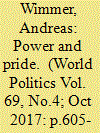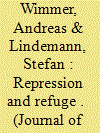| Srl | Item |
| 1 |
ID:
084907


|
|
|
| 2 |
ID:
056918


|
|
|
|
|
| Publication |
2003.
|
| Description |
p111-134
|
|
|
|
|
|
|
|
|
|
|
|
|
|
|
|
| 3 |
ID:
160916


|
|
|
|
|
| Summary/Abstract |
Democracy doesn't build nations, but already-built nations democratise more easily.
|
|
|
|
|
|
|
|
|
|
|
|
|
|
|
|
| 4 |
ID:
155594


|
|
|
|
|
| Summary/Abstract |
Why do some individuals embrace nationalist rhetoric and feel proud of their citizen ship while others do not? This article introduces an exchange-theoretic perspective, according to which national pride depends on access to political power. Seen from this perspective, members of ethnic groups that are not represented in national-level government should be less proud of their nation than those included in the polity. Furthermore, ethnic violence in the past or power-sharing arrangements in the present should reduce trust in the future stability of political representation and thus pride in the nation. From a dynamic point of view, members of ethnic groups whose level of political representation decreased in the past should also see their nation in a less positive light today. To show this, the author uses existing surveys to assemble a new dataset with answers to a similar question about national pride. It covers 123 countries that comprise 92 percent of the world's population. For roughly half of these countries, the ethnic groups listed in the surveys could also be found in another data set that contains information on the political status of these groups. Multilevel ordered logistic regressions at both the country and the group level confirm these hypotheses while taking into account a wide range of individual-level and country-level variables discussed in the existing literature.
|
|
|
|
|
|
|
|
|
|
|
|
|
|
|
|
| 5 |
ID:
159746


|
|
|
|
|
| Summary/Abstract |
This article asks why ethnic exclusion from executive-level state power leads to armed conflict in some cases but not in others. To resolve this puzzle, it focuses on the possible role of five additional, qualitatively coded factors that have been considered by either grievance or opportunity theories of civil war but for which quantitative data are not readily available. To assess the combined relevance of these factors, the authors use qualitative comparative analysis (QCA) to explore the diverging conflict trajectories of 58 ‘most similar’ ethnic groups. These groups have a uniformly high conflict propensity because they are politically excluded, situated in poor countries, live geographically concentrated, and comprise substantial parts of the population; yet, only 25 of them actually experienced violent conflict. The results show that the resentment created by ethno-political exclusion translates into violent conflict if the state reacts against initial protests and mobilization with indiscriminate violence, and if there is a refuge area either within or outside the country that allows regime opponents to organize armed resistance. Moreover, a more processual analysis of conflict dynamics reveals that the conditions conducive to ethnic rebellion appear in a particular temporal sequence with a clear and universal escalation pattern.
|
|
|
|
|
|
|
|
|
|
|
|
|
|
|
|
| 6 |
ID:
107264


|
|
|
| 7 |
ID:
094091


|
|
|
|
|
| Publication |
2010.
|
| Summary/Abstract |
Much of the quantitative literature on civil wars and ethnic conflict ignores the role of the state or treats it as a mere arena for political competition among ethnic groups. other studies analyze how the state grants or withholds minority rights and faces ethnic protest and rebellion accordingly, while largely overlooking the ethnic power configurations at the state's center. drawing on a new data set on ethnic power relations (EPR) that identifies all politically relevant ethnic groups and their access to central state power around the world from 1946 through 2005, the authors analyze outbreaks of armed conflict as the result of competing ethnonationalist claims to state power. the findings indicate that representatives of ethnic groups are more likely to initiate conflict with the government (1) the more excluded from state power they are, especially if they have recently lost power, (2) the higher their mobilizational capacity, and (3) the more they have experienced conflict in the past.
|
|
|
|
|
|
|
|
|
|
|
|
|
|
|
|
| 8 |
ID:
163297


|
|
|
|
|
| Summary/Abstract |
Nationalism has a bad reputation today. It is, in the minds of many educated Westerners, a dangerous ideology. Some acknowledge the virtues of patriotism, understood as the benign affection for one’s homeland; at the same time, they see nationalism as narrow-minded and immoral, promoting blind loyalty to a country over deeper commitments to justice and humanity. In a January 2019 speech to his country’s diplomatic corps, German President Frank-Walter Steinmeier put this view in stark terms: “Nationalism,” he said, “is an ideological poison.”
|
|
|
|
|
|
|
|
|
|
|
|
|
|
|
|